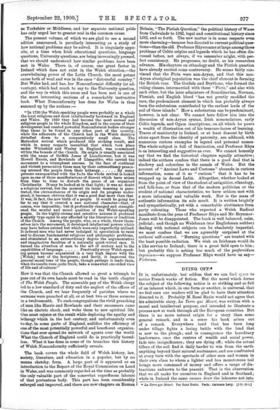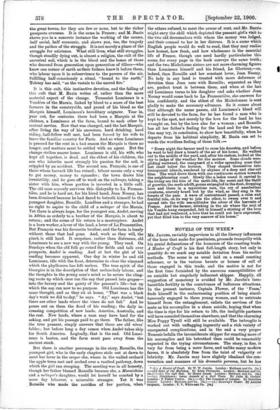DYING- OFF.* IT is, unfortunately, but seldom that we can
find 9race to notice French works of fiction. But the novel which forms the subject of the following notice is so striking and so full of an interest which, in one form or another, is universal, that we feel sure our readers will be glad to have their attention directed to it. Probably M. Rene Bazin would not agree that his admirable story, La Terre qui Meurt, was written with a moral and intellectual purpose, and intended to illustrate a process now at work through all the European countries. But there is no more natural origin for a story than some general remark, and in a sense his book arises out of a remark. Everywhere land that has been long under tillage fights a losing battle with the land that is new to the plough ; and in consequence the hereditary landowners, once the centres of wealth and social power, fade into insignificance ; they are dying off; while the actual tillers of the soil find it daily harder to win from the earth anything beyond their natural sustenance, and are confronted at every turn with the spectacle of other men and women in their own class to whom a lighter and less monotonous toil brings more command of money and offers a range of dis- tractions unknown to the peasant. That is the observation that we all make for ourselves in England and in Scotland; while in Ireland the same causes draw the labourer not into
• La Terre gut 2feurt. Par Ilene Barla Paris ; Calm= Levy. [3 fr. 50 0.]
the great towns, for they are few or none, but to the richer prospects overseas. It is the same in France ; and M. Bazin shows you in a concrete instance the working of the causes, half social, half economic, and shows you, too, the tragedy and the pathos of the struggle. It is not merely a phase of the struggle for existence. What still lives, what still struggles, though steadily dying out, is almost a religion, the cult of the ancestral soil, which is in the blood and the bones of those who descend from generation upon generation of tillers—who know one corner of earth as their fathers knew it before them, who labour upon it in subservience to the powers of the air, fulfilling half-consciously a ritual, "bound to the earth," Tolstoy has said, "as the vestals to the sacred fire."
It is this cult, this instinctive devotion, and the failing of this cult that M. Bazin writes of, rather than the more material aspect of the change. Toussaint Lumineau is a Vendeen of the Marais, linked by blood to a score of the best farmers in the countryside, and proud of his blood as the Marquis himself, Lumineau's hereditary seigneur. Year in, year out, for centuries there had been a Marquis at the chateau, a Lumineau at the farm, bound to each other by mutual service. Now that was changed, and the last Marquis, after living the way of his ancestors, hard drinking, hard riding, hail-fellow well met, had been forced by his wife to leave the familiar country for Paris. And so when Lumineau is pressed for the rent in a bad season the Marquis is there no longer, and matters must be settled with an agent. But the change strikes nearer home. Lumineau is old, his wife, who kept all together, is dead, and the eldest of his children, the son who inherits most strongly his passion for the soil, is crippled by an accident. The second son, Francois, is one of those whom barrack life has ruined ; labour means only a way to get money, money to squander ; the town draws him irresistibly, and he goes off to work on the railways, taking a sister with him, whose portion is invested in a little cafe. The old man scarcely survives this disloyalty to La Fromen- tire, and he is hard set, for his hired hand, Jean Nesmy, has been dismissed because he had dared to betroth himself to the youngest daughter, Rousille. Landless and a stranger, he had no right to aspire to the child of a inetayer of the Marais. Yet there is always hope, for the youngest son, Andre, serving in Africa as orderly to a brother of the Marquis, is about to return; and the scene of his return is a masterpiece. Andre is a born worker, a lover of the land, a lover of La Fromentiere. But Francois was his favourite brother, and the farm is lonely without those that had gone. And, work as they will, the pinch is still hard. It surprises, rather than distresses, old Lumineau to see a new way with the young. They read. On Sundays when the old folk go round the fields and talk over prospects, Andre is reading. And at last the gist of his reading becomes apparent; One day in winter he and old Lumineau, idle with the frost, determine to clear the vineyard which the phylloxera has left useless. The true spirit of the Georgics is in the description of that melancholy labour, and the thoughts in the young man's mind as he severs the cling- ing roots up which once ran the sap that passed into grapes— into the luxury and the gaiety of the peasant's life—but up which the sap ran now to no purpose. Old Lumineau has the same thought, and as they sit at home, "That was a black day's work we did to-day," he says. "Ay," says Andre, "but there are other lands where the vines do not fail." And he pours out on them the flood of his reading; the daily in- creasing competition of new lands, America, Australia, and the rest. New lands, where a man may have land for the asking, and get his passage paid to go there. The father, like the true peasant, simply answers that these are old wives' fables ; but before long a day comes when Andre takes ship for South America. Logically, that is the end. Old Lumi- neau is beaten, and the farm must pass away from the ancient stock.
But there is another personage in the story, Rousille, the youngest girl, who in the early chapters stole out at dawn to meet her lover in the verger dos, where in the walled orchard the apple trees met and arched over a vaulted pathway, down which the girl ran stooping. The meeting was in all honesty, though her father blamed Rousille because she, a illaraiehine and a metager's daughter, would let herself be courted by a mere day labourer, a miserable stranger. Yet it was - Rongille who made the sacrifice of her portion, when the others refused, to meet the amar of rent, and Mr. Bathe might envy the skill which depicted the peasant girl's visit to the two old dressmakers with whom the money was lodged, and their counsel to her in her distress. It is a scene which English people would do well to read, that they may realise how honest, how fresh, and how wholesome is the essential life of France, though one need hardly particularise this scene, for every page in the book conveys the same truth; and the two Michelomae sisters are not more charming figures than Lumineau himself and his friend, Le Glorieux,--or, indeed, than Rousille and her constant lover, Jean Nesmy. No lady in any land is treated with more deference of devotion than Jean uses with Rousille; separated as they are, perfect trust is between them, and when at the last old Lumineau turns to his daughter and asks whether Jean Nesmy would come back to La Fromentiere, she answers for him confidently, and the eldest of the Michelonnes is sent gladly to make the necessary advances. So it comes about that although the name passes, old Lumineau's blood will still be devoted to the farm, for he has found a man who is kept to the spot, not merely by the love for the land he has wrought on, but by the love also for a woman ; and Rousille has all her father's feeling for the land and for the home, One may try, in conclusion, to show how beautifully, when he departs from his habitual simplicity, M. Bazin can set to words the wordless feeling of these folk :—
" Every night the farmer used to cross his doorstep, and before he went to bed draw a breath of the air of his home. He walked out to the middle of the yard, and, after his custom, looked at the sky to judge of the weather for the morrow. Some clouds were gliding westward, the rearguard of a wider spreading mass that lost itself below the horizon. They shaped themselves into transparent islands, sundered by abysses of a deep and star-set blue. The wind drove them with one continuous motion towards the neighbouring coast. Slowly like a laden vessel it carried to the living sea the kiss of the earth-life, the scent and the thrill of growths, the seeds adrift, germs entangled in the dust, dropping here and there in a mysterious rain, the cry of numberless creatures, scarcely heard but by the wind, as they sing in the forests of the pass. A wave of contentment passed, a calm and fruitful tide, on its way to join the other, to sweep over it and spread into the wide sea-solitudes the odour of the harvests of France. And the farmer, drinking in the air where the soul of his Vend6e hung suspended, felt in himself a stirring of the love that had not weakened, a love that he could not have expressed, yet that filled him to the very marrow of his bones."







































 Previous page
Previous page